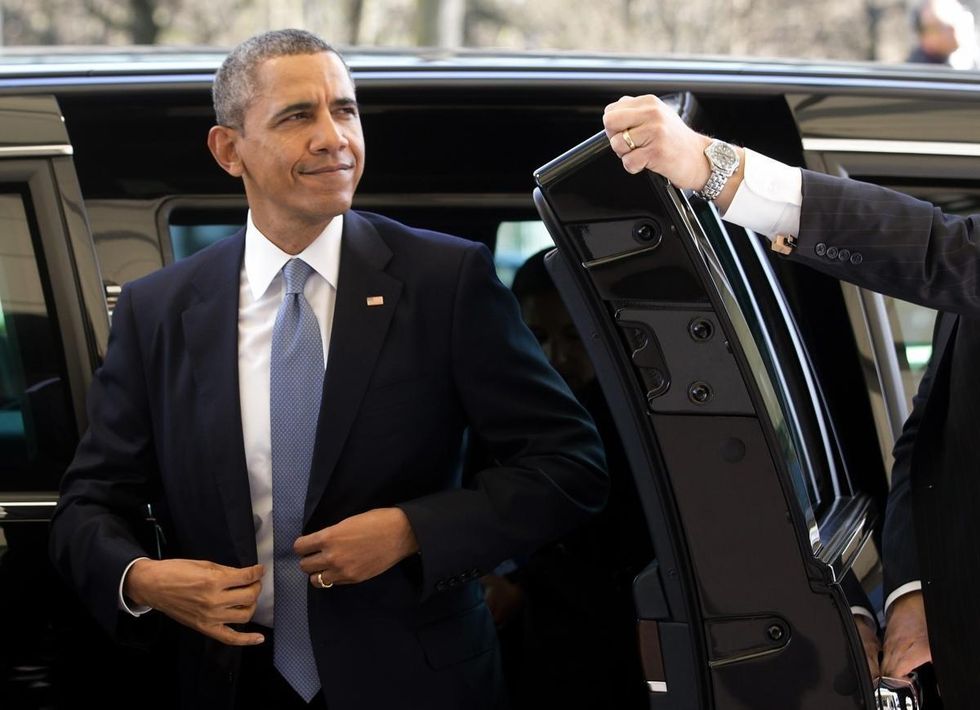As Nuclear Summit Begins, Critics Slam Expansion of US Arsenal
'Enormous state arsenals are the main problem'

Obama first announced the idea for a Global Summit on Nuclear Security in a 2009 speech, in which he declared, "I state clearly and with conviction America's commitment to seek the peace and security of a world without nuclear weapons." He said reducing the threat of nuclear weapons would be a key agenda item for his foreign policy and pledged, "To put an end to Cold War thinking, we will reduce the role of nuclear weapons in our national security strategy, and urge others to do the same."
Yet, Kate Hudson writing for Al Jazeera argues that the actual U.S. policy track record under Obama falls well short of his promises. She writes,
And what about strengthening the NPT - complying with that basically sound bargain where the US will move towards disarmament? As we learn from the Stockholm Institute (SIPRI), over the next decade, the US government intends to spend $214 bn to modernize nuclear delivery vehicles, warheads and production facilities.
This includes designing a new class of ballistic missile submarines, a new long-range bomber and a new air-launched cruise missile; studying options for the next-generation land-based ICBM; deploying a new nuclear-capable combat aircraft; producing or modernizing three types of nuclear warhead and building new nuclear weapon production facilities.
That sounds like serious re-armament, wholly at odds with NPT requirements.
She adds, "Enormous state arsenals are the main problem, together with the seeming determination of those states to modernize and upgrade rather than downsize and disarm."
Jay Coghlan, Executive Director of Nuclear Watch New Mexico, argued in an interview last week that a reduction of the U.S. nuclear arsenal would be a step towards greater "national security."
"[E]very weapon that we retire is one less nuclear weapon waiting for an accident or that we cannot fail to keep absolutely secure," he argues.
_____________________
An Urgent Message From Our Co-Founder
Dear Common Dreams reader, The U.S. is on a fast track to authoritarianism like nothing I've ever seen. Meanwhile, corporate news outlets are utterly capitulating to Trump, twisting their coverage to avoid drawing his ire while lining up to stuff cash in his pockets. That's why I believe that Common Dreams is doing the best and most consequential reporting that we've ever done. Our small but mighty team is a progressive reporting powerhouse, covering the news every day that the corporate media never will. Our mission has always been simple: To inform. To inspire. And to ignite change for the common good. Now here's the key piece that I want all our readers to understand: None of this would be possible without your financial support. That's not just some fundraising cliche. It's the absolute and literal truth. We don't accept corporate advertising and never will. We don't have a paywall because we don't think people should be blocked from critical news based on their ability to pay. Everything we do is funded by the donations of readers like you. Will you donate now to help power the nonprofit, independent reporting of Common Dreams? Thank you for being a vital member of our community. Together, we can keep independent journalism alive when it’s needed most. - Craig Brown, Co-founder |

Obama first announced the idea for a Global Summit on Nuclear Security in a 2009 speech, in which he declared, "I state clearly and with conviction America's commitment to seek the peace and security of a world without nuclear weapons." He said reducing the threat of nuclear weapons would be a key agenda item for his foreign policy and pledged, "To put an end to Cold War thinking, we will reduce the role of nuclear weapons in our national security strategy, and urge others to do the same."
Yet, Kate Hudson writing for Al Jazeera argues that the actual U.S. policy track record under Obama falls well short of his promises. She writes,
And what about strengthening the NPT - complying with that basically sound bargain where the US will move towards disarmament? As we learn from the Stockholm Institute (SIPRI), over the next decade, the US government intends to spend $214 bn to modernize nuclear delivery vehicles, warheads and production facilities.
This includes designing a new class of ballistic missile submarines, a new long-range bomber and a new air-launched cruise missile; studying options for the next-generation land-based ICBM; deploying a new nuclear-capable combat aircraft; producing or modernizing three types of nuclear warhead and building new nuclear weapon production facilities.
That sounds like serious re-armament, wholly at odds with NPT requirements.
She adds, "Enormous state arsenals are the main problem, together with the seeming determination of those states to modernize and upgrade rather than downsize and disarm."
Jay Coghlan, Executive Director of Nuclear Watch New Mexico, argued in an interview last week that a reduction of the U.S. nuclear arsenal would be a step towards greater "national security."
"[E]very weapon that we retire is one less nuclear weapon waiting for an accident or that we cannot fail to keep absolutely secure," he argues.
_____________________

Obama first announced the idea for a Global Summit on Nuclear Security in a 2009 speech, in which he declared, "I state clearly and with conviction America's commitment to seek the peace and security of a world without nuclear weapons." He said reducing the threat of nuclear weapons would be a key agenda item for his foreign policy and pledged, "To put an end to Cold War thinking, we will reduce the role of nuclear weapons in our national security strategy, and urge others to do the same."
Yet, Kate Hudson writing for Al Jazeera argues that the actual U.S. policy track record under Obama falls well short of his promises. She writes,
And what about strengthening the NPT - complying with that basically sound bargain where the US will move towards disarmament? As we learn from the Stockholm Institute (SIPRI), over the next decade, the US government intends to spend $214 bn to modernize nuclear delivery vehicles, warheads and production facilities.
This includes designing a new class of ballistic missile submarines, a new long-range bomber and a new air-launched cruise missile; studying options for the next-generation land-based ICBM; deploying a new nuclear-capable combat aircraft; producing or modernizing three types of nuclear warhead and building new nuclear weapon production facilities.
That sounds like serious re-armament, wholly at odds with NPT requirements.
She adds, "Enormous state arsenals are the main problem, together with the seeming determination of those states to modernize and upgrade rather than downsize and disarm."
Jay Coghlan, Executive Director of Nuclear Watch New Mexico, argued in an interview last week that a reduction of the U.S. nuclear arsenal would be a step towards greater "national security."
"[E]very weapon that we retire is one less nuclear weapon waiting for an accident or that we cannot fail to keep absolutely secure," he argues.
_____________________

